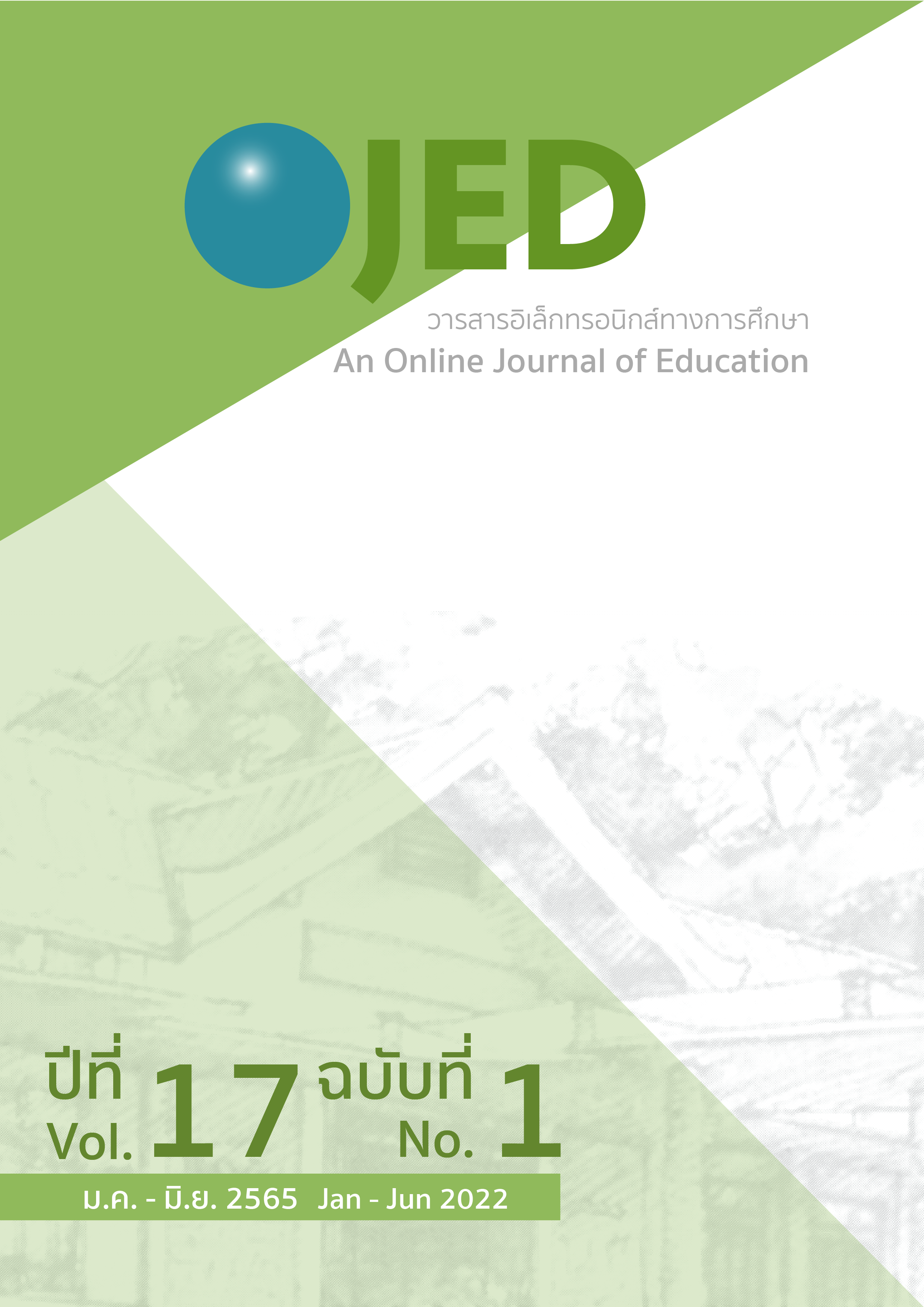Development of a Readiness Test of Pre-Service Biology Teachers
DOI:
https://doi.org/10.14456/ojed.2022.38Keywords:
readiness test, biology, TPACKAbstract
The purposes of this research were: 1) to study the elements and indicators to develop a test to measure the readiness of pre-service biology teachers based on the TPACK framework; 2) to verify the quality of the content validity and reliability of the readiness tests of pre-service biology teachers based on the TPACK framework, and 3) to analyze the readiness of pre-service teachers. After testing to test the readiness of pre-service biology teachers based on the TPACK framework, an overall score was allocated. The sample comprised undergraduate students, while the pre-service teachers are teachers of biology. These students are under the Autonomous University and the Rajabhat University from the faculty of Education, and all are based in Bangkok. The measurement used in this research involved readiness tests of pre-service biology teachers based on the TPACK framework. The results showed that: 1) the elements used to determine the availability of pre-service biology teachers have three components: content knowledge, pedagogical knowledge, and technological knowledge including 8 indicators for content knowledge, 1 indicator for pedagogical knowledge, and 3 indicators for technological knowledge, which are used to develop a test that consists of multiple-choice items and subjective questions numbering 130 items in total. 2) The quality of the content validity is then tested. The multiple-choice exam and subjective criteria index values greater than 0.5 for the IOC are reviewed by an expert and the reliability scores of the test content knowledge, pedagogical knowledge, and technological knowledge are 0.9, 0.704, and 0.816. 3) Analysis is conducted to compare the readiness of pre-service biology teachers based on the TPACK framework in the two groups of pre-service biology teachers whereby those of Autonomous University exhibited greater readiness than those of Rajabhat University at a significance level of 0.05.
References
กระทรวงศึกษาธิการ. (2546). พระราชบัญญัติสภาครูและบุคลากรทางการศึกษา พุทธศักราช 2546. https://www.moe.go.th
บุษราคัม ดุลบุตร. (2555). การวิเคราะห์ความตรงเชิงจำแนกของแบบประเมินการฝึกประสบการณ์วิชาชีพครูสำหรับนิสิต/นักศึกษาวิชาชีพครู: การศึกษาพหุลักษณะและแหล่งข้อมูลพหุ [วิทยานิพนธ์ปริญญามหาบัณฑิต]. จุฬาลงกรณ์มหาวิทยาลัย.
ประสาท เนืองเฉลิม. (2558). การเรียนรู้วิทยาศาสตร์ในศตวรรษที่ 21. จุฬาลงกรณ์มหาวิทยาลัย.
วรงค์ศรี แสงบรรจง. (2555). เครื่องมือและโมเดลการวัดทีแพค-เอสของนิสิตนักศึกษาครู: การพัฒนาและวิเคราะห์เปรียบเทียบโมเดลแข่งขัน [วิทยานิพนธ์ปริญญาดุษฎีบัณฑิต]. จุฬาลงกรณ์มหาวิทยาลัย.
สำนักงานคณะกรรมการการศึกษาขั้นพื้นฐาน กระทรวงศึกษาธิการ. (2551). หลักสูตรแกนกลางการศึกษาขั้นพื้นฐาน พุทธศักราช 2551. https://www.curriculum51.net
หทัยทิพย์ สีส่วน. (2557). ความสัมพันธ์เชิงสาเหตุระหว่างคุณภาพของกระบวนการฝึกประสบการณ์วิชาชีพกับความยึดมั่ยผูกพันในการทำงานของนิสิตครูโดยมีความเชื่อในความสามารถของตนเป็นตัวแปรส่งผ่าน. An Online Journal of Education, 9(2), 335-349.
Jüttner, M., Boone, W., Park, S., & Neuhaus, B. J. (2013). Development and use of a test instrument to measure biology teachers’ content knowledge (CK) and pedagogical content knowledge (PCK). Educational Assessment, Evaluation and Accountability, 25(1), 45-67.
Koehler, M. J., & Mishra, P. (2009). What Is technological pedagogical content knowledge?. Contemporary Issues in Technology and Teacher Education, 9(1), 60-70.
Mishra, P., & Koehler, M. J. (2006). technological pedagogical content knowledge: A framework for teacher knowledge. Teachers College Record, 108(6), 1017-1054.
Shulman, L. S. (1986). Those who understand: Knowledge growth in teaching. Educational Researcher, 15(2), 4-14.
Downloads
Published
How to Cite
Issue
Section
License
Copyright (c) 2022 An Online Journal of Education

This work is licensed under a Creative Commons Attribution-NonCommercial-NoDerivatives 4.0 International License.




